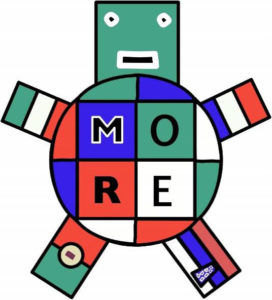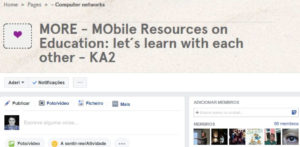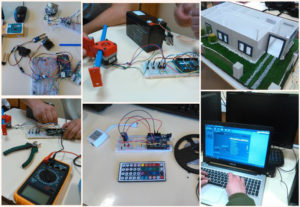-
Supported by Programme: Erasmus+
Key Action: Cooperation for innovation and the exchange of good practices
Action Type: Strategic Partnerships for school education and eTwinning
- How did the idea to start the project emerge?
This project starts in 2012, in eTwinning1 with two teachers: one from Italy and other from Portugal. In eTwinning it is possible to add partners to projects we add two new teacher from France and Slovenia. All the teacher invoved were eTwinning ambassadors and we knew what we wanted to achieve, so we decide to apply to as Erasmus + KA2, because we felt that it was important to our students to develop skills such as communication and collaboration, critical thinking, creativity, problem solving, self-esteem and work with more advanced tools in the IT world, like microcontrollers, robots and real programming.
- What is innovative?
“MORE – MObile Resources on Education: let´s learn with each other” was a project carried out from September 2014 to August 2016, that joined specialized teachers in different field of education, such as robotics, microcontrollers, mobile apps programming and Math and Science from primary school. Teacher aimed to spread their knowledge to increase the students’ participation in learning and better prepare them for their future jobs or career all over Europe.
All the partners wanted to join their knowledge and expertise to:
- Develop devices to record scientific experiments
- Build some simple devices to help younger students practice mathematical notions
- Produce Learning objects (Educational resources) related with Maths and Science
- Produce educational games with devices like robots and microcontrollers
France helped with the installation of microcontrollers with some sensors to collect data like temperature and humidity, movements, sounds detector, light intensity and other in order to measure some characteristics of the environment; Portugal programmed in Visual Studio and APP inventor to acquire that data to a database; Italy adapted microcontrollers to a moving “sensitive” Robots and older students from Slovenia learned from partners and act as tutors in their country to teach colleagues and children from primary school. Also children from primary school act as “beta tester” to Math and Science apps.
Schools involved in the project:
- Portugal: Agrupamento de Escolas da Batalha, Batalha
- Italy: I.I.S. “N. Pellegrini”, Sassari (SS)
- France: Lycée Saint Cricq, Pau
- Slovenia: OŠ Preska, Medvode
We used new methodologies with scenarios and project base learning approaches were students’ responses to real-world problems working in teams with students from all countries. Teacher created a secret facebook group for students communicate and interact with each other, but also to work between the mobilities.
Students had to investigate how to solve some problems and share their learning in each mobilities, where they were responsible to prepare workshops to other colleagues and teachers.
Although teachers were there to support if needed, students were the tutors of the workshops, so previously they had to gain new knowledge, understand new concepts and work in teams, decide, find solutions, prepare recourse and tutorials and apply their learning in new contexts and develop their collaboration and communication skills through the workshops, by presenting their work to partners and also teach them to use other devices.
- Competences developed
When we apply to the project we believe that our project would allow students to develop the eight key competences2, from the Lifelong Learning Key Competences for (European Commission, 2006), like: Communicating in a mother tongue and in a foreign language, Mathematical, scientific and technological competence, Digital competence, Learning to learn, Social and civic competences, Sense of initiative and entrepreneurship and Cultural awareness and expression. Now that the project had finished we are sure that our students achieve these competences and also some other mentioned by US Partnership for 21st Century Skills (P213), such Life and Career Skills were they acquired:
- Flexibility & Adaptability
- Initiative & Self Direction
- Social & Cross-Cultural Skills
- Productivity & Accountability
- Leadership & Responsibility
In Portugal, for the first time in our school we had a success of 90% in a professional course, usually student dropout school in a much higher rate. Learning to work with robots, microcontrollers (Arduinos) gave them new ideas for their final project course.
Today students are much more responsible for their learning, achieve a different level of initiative and are also more openmind to new culture.
Our project as all information available here.
Also can check the project info here.


